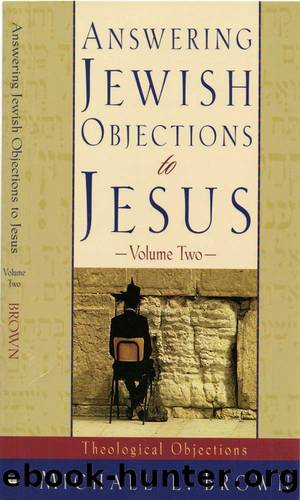Answering Jewish Objections to Jesus : Volume 2: Theological Objections by Brown Michael L

Author:Brown, Michael L. [Brown, Michael L.]
Language: eng
Format: epub
Publisher: Baker Publishing Group
Published: 2000-11-01T00:00:00+00:00
3.14. The Book of Jonah shoots down all your arguments about sacrifice and atonement, especially with reference to Gentiles. When Jonah preached, the people repented, and God forgave themâno sacrifice, no blood offering.
Did you know that traditional Judaism, based on the Torah, teaches that the Temple sacrifices made atonement for the Gentile world? This was part of Israelâs call as a priestly nation, and it was Israelâs Temple offerings that helped make Gentile repentance acceptable to God.
When God brought our people out of Egypt, he said to them, âYou yourselves have seen what I did to Egypt, and how I carried you on eaglesâ wings and brought you to myself. Now if you obey me fully and keep my covenant, then out of all nations you will be my treasured possession. Although the whole earth is mine, you will be for me a kingdom of priests and a holy nationâ (Exod. 19:4â6).
Israel was called to be a priestly nation, and part of that calling included making intercession and atonement for the nations of the world. (Remember, this was an integral part of the priestly calling, therefore, as a priestly nation , Israel would make intercession and atonement for the world.) According to this concept, when a Gentile nation repented and turned to God, its repentance would be accepted in conjunction with the sacrifices and prayers offered up by the people of Israel. Thatâs why the prophet Jonah called on the Ninevites to repent of their sins. Offering up sacrifices was Israelâs job as a priestly nation.
âWho says so?â you ask.
Actually, the Talmudic rabbis say so. In b. Sukkah 55b (see also Pesikta deRav Kahana, Buber edition, 193bâ194a) we read that the seventy bulls that were offered every year during the Feast of Tabernacles (Sukkot; see Num. 29:12â34) âwere for the seventy nations,â which Rashi explains to mean, âto make atonement for them, so that rain will fall throughout the world.â [259] In this contextâand in light of the destruction of the Temple by the Romans in 70 C.E. âthe Talmud records the words of Rabbi Yohannan: âWoe to the nations who destroyed without knowing what they were destroying. For when the Temple was standing, the altar made atonement for them. But now, who will make atonement for them?â Such a strong statement bears repeating: âWhen the Temple was standing, the altar made atonement for them.â Blood sacrifices were indispensable. (See above, 3.10, for an in-depth discussion of this.)
Now, I recognize that God can have mercy on whom he wants to have mercy and compassion on whom he wants to have compassion (see Exod. 33:19), but he has ordained prayer, atonement rites, repentance, and faith as the means by which his people participate with him in procuring forgiveness and mercy. Thus, he singled out one particular people, the nation of Israel, and called them to conduct the Temple services, celebrating the holy days and offering sacrifices for their own sins and the sins of the world. Ultimately, these sacrifices pointed to the once-and-for-all sacrifice of Yeshua for the sins of the world.
Download
This site does not store any files on its server. We only index and link to content provided by other sites. Please contact the content providers to delete copyright contents if any and email us, we'll remove relevant links or contents immediately.
Christian Ethics by Wilkens Steve;(854)
Christian Ethics for a Digital Society by Kate Ott(778)
Fearfully and Wonderfully Made by Philip Yancey & Paul Brand(769)
God and the Multiverse by Victor J. Stenger(672)
Numbers by Ronald B. Allen(632)
How to Read Slowly by James W. Sire(613)
Christian Ethics: An Introduction to Biblical Moral Reasoning by Wayne Grudem(597)
The City of God by Saint Augustine & Marcus Dods(577)
Monastic Archaeology by Unknown(564)
Morality by Jonathan Sacks(564)
The Technological System by Jacques Ellul(543)
Amish Grace by Donald B. Kraybill & Nolt Steven M. & Weaver-Zercher David L(531)
Death of the Doctor by Unknown(525)
The Disabled Church by Rebecca F. Spurrier;(521)
Jesus: A New Vision by Whitley Strieber(518)
Children of Lucifer; The Origins of Modern Religious Satanism by Ruben van Luijk(505)
Critical Writings by Joyce James;(499)
Redeeming Sociology by Vern S. Poythress(485)
The Church in the Early Middle Ages by G.R. Evans(476)
